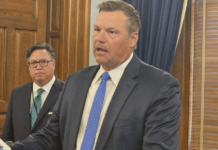(Updated to reflect justice’s relationship with the Legislature; previous interviews given by the justice; comments from the governor and leading Republican lawmaker; relevant links; with edits throughout)
Kansas Supreme Court Chief Justice Lawton Nuss on Friday announced that he will retire after serving 17 years on the high court.
“I consider my service on the Supreme Court to be the greatest privilege of my 37-year legal career,” Nuss said in a statement.
“It has given me the honor of working with the nearly 2,000 dedicated people ― judges and employees alike ― of the judicial branch of government. I am extremely proud of what all these good folks have accomplished for their fellow Kansans.”
Nuss has served as a justice on the Supreme Court since 2002 and as chief justice since 2010. He will retire Dec. 17.
Nuss’ tenure was marked by a difficult relationship with the Kansas Legislature, which in the past took on efforts to rein in the Supreme Court’s authority.
Conservative lawmakers increasingly saw the court under Nuss’ leadership as more of a political animal especially with the chief judge’s in-your-face approach to dealing with lawmakers.
They criticized decisions on school finance, the death penalty and most recently an opinion finding the right to an abortion in the state constitution.
Five years ago, Nuss lashed out at the Legislature over a bill that redirected administrative power away from the Supreme Court to the lower courts.
The court even issued a statement opposing the legislation when former Gov. Sam Brownback signed it into law, which let local judges pick chief district judges instead of the high court. The law also allowed local judges, not the Supreme Court, to manage their own budgets.
Ultimately, the state Supreme Court found the law was unconstitutional. Nuss recused himself from that case.
In 2013, Nuss accused a leading senator of coercion for tying approval of parts of the judiciary budget to judges supporting a plan for changing how appellate judges are selected. “We find this linkage distasteful – and unacceptable,” Nuss said at the time.
Earlier that same year, former House Speaker Ray Merrick rebuffed the chief justice’s request to address a joint session of the Legislature to present the state of the judiciary report. Merrick said lawmakers complained the report was a waste of time.
In a rare 2014 interview with The Kansas City Star (and this reporter in particular), Nuss said he didn’t intentionally start fights with lawmakers. He said he was trying to protect the integrity of the judiciary.
“When I see that authority and the respect for this constitutional institution eroded or being undermined, yes, I speak out,” Nuss said at the time.
Conservative lawmakers’ distrust in Nuss went as far back as 2006, when he was admonished by a disciplinary board for talking about school finance with key legislators.
The judicial ethics panel said the justice violated three judicial ethics canons when he spoke with Sens. Steve Morris and Pete Brungardt about a school-funding bill while the court was considering school finance litigation.
By 2015, the judge seemed to recognize that he needed to fashion a new style for dealing with the Legislature.
After his state of the judiciary speech in 2015, Nuss said he wanted to avoid a high-profile fight with the Legislature over funding the courts.
“I was afraid I was turning into a whiner and a complainer,” Nuss told reporters after giving his annual state of the judiciary address. “I decided instead of that approach, we’ll try another one.”
In a 2016 profile of Nuss by Kansas Leadership Center’s publication, The Journal, the chief justice talked about an approaching retention election in which he was facing opposition.
“The people of Kansas have retained me in office in two different statewide elections. And they didn’t keep me just so I would say yes to everything and just go along with what some politicians want me to do,” Nuss told The Journal.
“They’re expecting a lot more of their chief justice than that. Otherwise anybody could do this job if you’re just going to say yes, yes, yes to everything.”
Nuss was appointed to the Supreme Court by former Gov. Bill Graves. He graduated from the University of Kansas School of Law (same class as Brownback) after serving in the United States Marine Corps.

Justice Marla Luckert, who is next in seniority on the court, said Nuss has been an outstanding leader of the judicial branch the last 10 years
“During his tenure as chief justice, our state courts have undergone tremendous change. We have steadily worked on modernizing how we manage cases with an eye toward more efficient service to the people of Kansas,” Luckert said.
“At the same time, Chief Justice Nuss has earnestly pursued funding levels that will allow us to bring employee pay to market rates and to offer competitive pay for judges, both of which are critical to the effective delivery of justice.”
Kansas Court of Appeals Judge Steve Leben tweeted out a thank you for Nuss’ contributions to the court.
“He and his colleagues have worked to modernize our court system and to get reasonable salaries,” Leben wrote. “Thanks for your services to Kansans, Chief!”
Nuss’ retirement will give Democratic Gov. Laura Kelly a second appointment to the Supreme Court after Justice Lee Johnson announced that he will retire Sept. 8.
Kelly praised Nuss’ public service on the bench.
“As a Marine, a lawyer, a jurist, and a Kansan, Chief Justice Nuss has taken challenges head on and never shied from struggle or duty,” Kelly said in a statement. “He’s been in the arena, doing difficult work on behalf of Kansans. And he has done it well.”
State Supreme Court justices are picked by a nominating commission made up of five lawyers and four nonlawyers.
The commission winnows the list to three names that are sent to the governor, who makes the appointment.
How long that nominating process will remain in place is in question.
There is expected to be an effort next year to change the system to a federal model, where the chief executive makes a nomination who is confirmed by the Senate.
While the federal model would give Kelly more power in making appointments, the governor has been in favor of the current judicial nominating process.
Republican state Sen. Ty Masterson said he thought the timing of the retirements was not a coincidence.
Nuss’ and Johnson’s announcements demonstrate “that Gov. Kelly and her political allies on the bench are clamoring to pack the high court before the Kansas people – through their elected representatives – have a chance to reform the process to include Senate confirmation,” Masterson said.
“Kansans deserve to have a voice in who sits on the highest court in the state and that comes through a requirement for Senate confirmation,” Masterson said. “This is why the legislature must take this issue up during interims and when we return in January.”
















